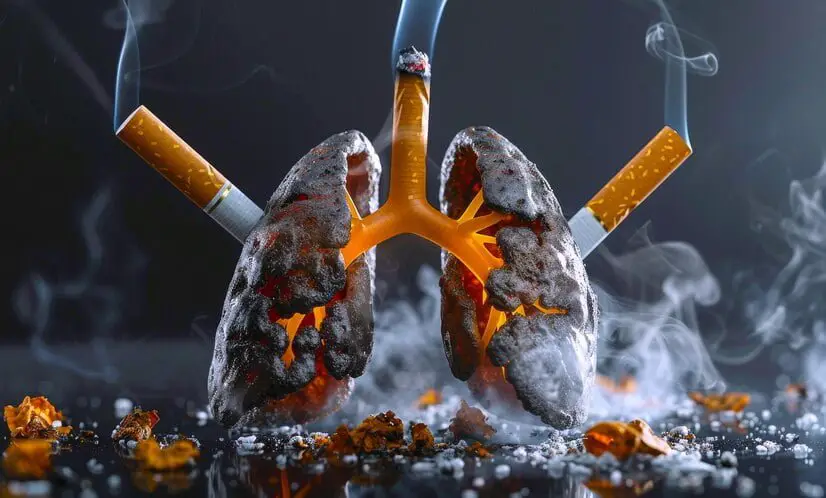Table of Contents
Nicotine stay in your system
Nicotine, the primary addictive ingredient found in tobacco products, is a stimulant that affects your brain, nervous system, and other bodily functions. Understanding how long nicotine stays in your system is important, especially for people who are trying to quit smoking, preparing for a nicotine test, or just being aware that it can How do they affect the body?
The residence time of nicotine in the body depends on several factors, such as frequency of use, metabolism, and general health. In this detailed guide, we’ll cover how nicotine is metabolized, how long it remains detectable, and the various factors that affect its excretion from the body.

1. Nicotine metabolism and half-life
When nicotine enters your body – whether through smoking, vaping, or chewing tobacco – it is quickly absorbed into the bloodstream. The liver processes nicotine and converts it into several by-products, the most notable of which is cotinine. Cotinine is often used as a biomarker in nicotine testing because it lasts longer in the body than nicotine.
The half-life of nicotine is about 2 hours, meaning half of the nicotine in your system is gone within that time. However, cotinine has a fairly long half-life, approximately 15 to 20 hours, making it easy to detect over a long period of time. This is why many nicotine tests focus on cotinine levels rather than nicotine itself.

2. Detection times for nicotine and cotinine in different tests
Nicotine and its metabolite cotinine can be detected by various tests, such as blood, urine, saliva, and hair follicle analysis. The duration of detection depends on the type of test, as well as how often the person uses nicotine products.
a. blood test
Nicotine can be detected in the bloodstream for a short time—usually 1 to 3 days after the last use. However, depending on the frequency of use, cotinine stays in the blood longer, about 1 to 10 days. Heavy smokers will show higher cotinine levels, which may increase this detection window.
- Light or occasional smokers: Nicotine and cotinine are likely to clear within 1 to 3 days.
- Heavy smokers: Cotinine can be detected for 10 days or longer depending on the sensitivity of the test.
B. Urine Test
Urine tests are commonly used to detect nicotine and cotinine levels. In occasional or light smokers, nicotine is usually cleared from the urine within 3 to 4 days. However, for chronic or heavy smokers, nicotine and cotinine may remain detectable for up to 3 weeks.
- light users: 2 to 4 days to detect nicotine.
- Heavy users: up to 3 weeks to detect cotinine.
c. saliva test
Nicotine can also be detected in saliva for approximately 1 to 4 days. Sputum tests are commonly used in workplaces and are easy to administer. As with blood and urine tests, cotinine levels will be higher in chronic smokers, which may increase detection time.
- Light users: 1 to 3 days.
- Heavy Users: Up to 4 days or more.
d. Hair follicle test
Hair follicle tests have the longest detection window. Nicotine and cotinine can be found in hair follicles for 90 days or even longer. This is because hair traps chemicals from the bloodstream, and as hair grows, it keeps a record of substance use over time.
Hair testing is less common for nicotine but is used in certain cases, such as forensic testing or certain employment requirements where monitoring of long-term nicotine use is required.
- Light and heavy users: Up to 3 months.
3. Factors Affecting Nicotine Clearance
Several factors affect how long nicotine stays in your system, including the type of tobacco product you use, individual metabolism, and lifestyle choices. Here are the key factors:
a. Frequency of use
The more often you smoke or use nicotine products, the longer the nicotine and cotinine stay in your system. Occasional smokers or those who vape occasionally clear nicotine more quickly than chronic or heavy smokers, whose bodies can take weeks to eliminate cotinine.
- Light users: Nicotine clears quickly.
- Heavy users: Cotinine remains detectable for a long time.
B. Metabolism
Your body’s metabolic rate significantly affects how quickly nicotine is broken down. People with a fast metabolism process nicotine and cotinine more quickly, leading to faster elimination from the body. Factors affecting metabolism include:
- Age: Younger people usually have a faster metabolism.
- Genetics: Some individuals naturally have a faster metabolic rate.
- Physical Activity: Regular exercise can increase your metabolic rate, speeding up nicotine clearance.
c. Hydration and diet
Staying hydrated helps flush nicotine and other toxins out of your system. The more water you drink, the faster your body can eliminate waste products like nicotine. Additionally, foods rich in antioxidants, such as fruits and vegetables, can aid in the detoxification process.
- Hydration: Drinking water accelerates detox.
- Diet: Foods rich in antioxidants can help with nicotine metabolism.
d. Liver and Kidney Health
Healthy liver and kidney function play an important role in the elimination of nicotine and its byproducts. People with liver or kidney disease may process nicotine more slowly, leading to longer detection times.
- Healthy Organs: Rapid elimination of nicotine.
- Organ dysfunction: prolonged exposure to nicotine.

4. Ways to speed up nicotine withdrawal
If you want to speed up the process of getting rid of nicotine from your system, here are a few strategies that can help:
a. Increase fluid intake
Drinking plenty of water is one of the most effective ways to flush nicotine and its byproducts from your system. Staying hydrated helps your body flush out toxins more quickly through urine.
B. Exercise
Engaging in regular physical activity can help boost your metabolism, which allows your body to process and eliminate nicotine faster. Cardiovascular exercise, such as running, swimming, or cycling, is especially effective.
c. Eat a healthy diet
Eating a diet rich in fruits, vegetables, and whole grains can help your body’s detoxification process. Foods rich in vitamins C and E, such as oranges, spinach and nuts, can also help flush nicotine from your system.
d. Avoid nicotine products
To completely eliminate nicotine, it is important to avoid all forms of nicotine, including cigarettes, vaping, nicotine patches and gum. Continued use will delay the clearance of nicotine from your system.
FAQ How long does nicotine stay in your system?
1. How long does nicotine stay in your system?
Nicotine usually stays in your system for 1 to 4 days after you stop using it. However, depending on the type of test used and the frequency of nicotine use, its byproduct, cotinine, can remain detectable for up to 3 weeks.
2. What is cotinine, and why is it important?
Cotinine is the primary metabolite of nicotine, which is formed when the body breaks down nicotine. It is often measured in tests because it stays in the system longer than nicotine. Cotinine is detectable in the body for 3 weeks in urine and 3 months in hair follicles.
3. What tests are used to detect nicotine in the body?
Nicotine can be detected using a variety of tests, including:
- Blood tests: Nicotine is detectable for 1 to 3 days, while cotinine can be detected for 10 days.
- Urine Tests: Nicotine is detectable for 3 to 4 days, but cotinine can be detected for 3 weeks in heavy smokers.
- Saliva Tests: Nicotine can be detected for 1 to 4 days.
Hair Follicle Tests: Cotinine can stay in hair for 90 days or longer.
—
4. Does vaping nicotine stay in your system as long as smoking does?
Yes, the nicotine from vaping stays in your system almost as long as the nicotine from smoking. Both deliver nicotine to the body, and the metabolic pathway follows a similar pattern to cotinine, regardless of the delivery mechanism.
5. What factors affect how long nicotine stays in your system?
Several factors affect how long nicotine and cotinine stay in your system:
- Frequency of Use: Heavy or chronic smokers/vapers will have nicotine in their system longer.
- Metabolism: People with a fast metabolism eliminate nicotine more quickly.
- Age: Younger people metabolize nicotine faster.
- Overall Health: Liver and kidney function can affect how quickly nicotine is processed.
- Hydration and Diet: Staying hydrated and eating foods rich in antioxidants can help detoxify nicotine faster.
—
6. Can drinking water help flush nicotine out of your system faster?
Yes, staying hydrated can help your body flush out nicotine faster. Drinking water stimulates urination, which helps flush nicotine and its byproducts from your body.
7. How can I speed up the process of eliminating nicotine from my body?
To speed up nicotine withdrawal, consider:
- Increase water intake to help flush out toxins.
- Exercise to increase metabolism and promote detoxification through sweating.
- Eat a healthy diet Rich in fruits, vegetables and antioxidants.
- avoidance of excess nicotine through smoking, vaping, or nicotine replacement products.
8. Can secondhand smoke cause nicotine to be detected in my system?
Yes, exposure to secondhand cigarettes can cause small amounts of nicotine to be detected in your system, although it is usually lower than in active smokers or vapers. However, sustained or significant secondhand exposure may increase detectable levels.
9. Will nicotine show up on a job drug test?
Some employers conduct nicotine testing, particularly in industries related to health care or for insurance purposes. These tests usually look for cotinine, a nicotine metabolite, in urine, blood or saliva. If you have recently used nicotine products, these tests can detect it.
10. How long before the nicotine test should I stop using nicotine?
To ensure that nicotine is no longer detectable, it is generally recommended to stop using nicotine products at least 1 to 3 weeks before the test. This allows enough time for nicotine and cotinine to leave your system, depending on frequency of use and individual metabolism.
11. Does nicotine last longer in the body if you use a nicotine patch or gum?
Yes, nicotine from patches and gum can stay in your system, as these products deliver nicotine into the bloodstream. The timeline for cessation is similar to smoking or vaping, although the amount of nicotine absorbed may vary by product.
2. How long does it take to completely detox from nicotine?
Complete nicotine detox usually takes 1 to 3 weeks, but it may take longer for cotinine to become undetectable, especially in heavy users. Detox times can also vary based on lifestyle factors, such as diet and exercise.
Conclusion
On average, nicotine stays in your body for about 1 to 4 days, but its primary metabolite, cotinine, can last much longer—up to 3 weeks in urine tests and in hair. I follicles up to 3 months. The exact duration depends on frequency of use, metabolism, overall health, and type of test being used.
By staying hydrated, exercising, and eating a nutritious diet, you can help your body eliminate nicotine faster. However, heavy smokers and chronic users will experience longer detection times due to the accumulation of cotinine in their bodies.
Ultimately, understanding how long nicotine stays in your system can help you make informed decisions, whether you’re trying to quit smoking, preparing for a test, or simply looking to detox. Read More about health

